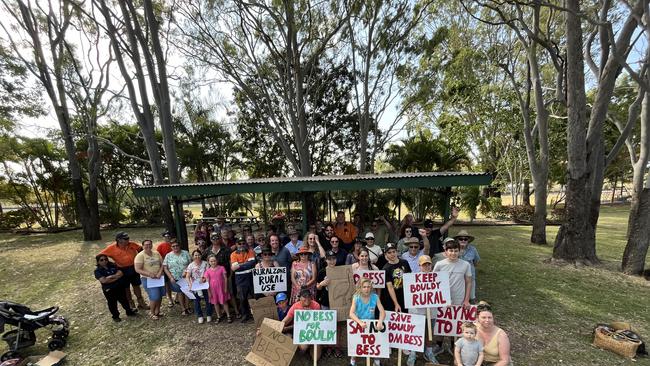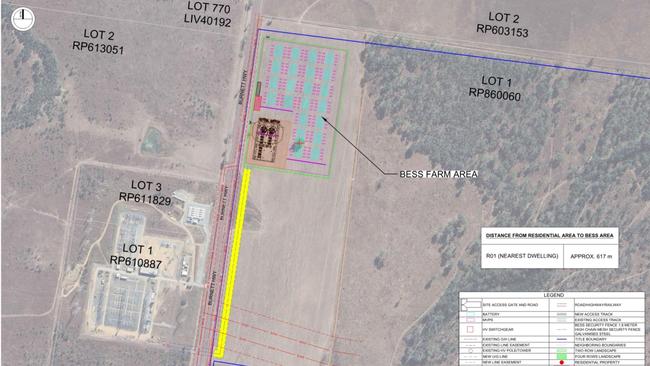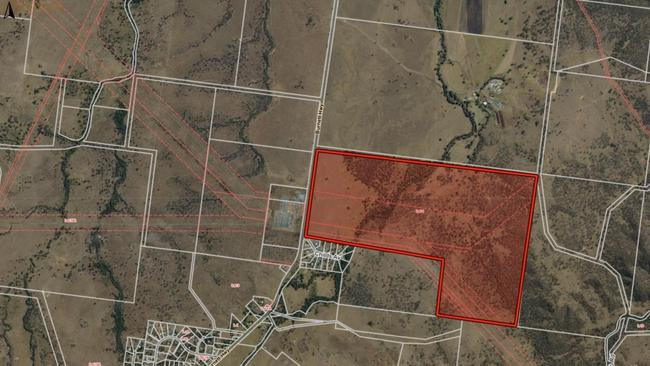Rockhampton Regional Council votes on battery energy storage system at Bouldercombe
The proposed 500MW project is 10 times bigger than the nearby Genex Power system where a Tesla battery caught fire last year.

Gladstone
Don't miss out on the headlines from Gladstone. Followed categories will be added to My News.
An application to build a massive 500-megawatt battery energy storage system (BESS) near a small rural town has been rejected by Rockhampton Regional Council after it attracted more than 300 submissions against it.
The proposed BESS, if constructed at Bouldercombe by ACEnergy, would be the largest battery storage system in the region. However, several councillors at Tuesday’s meeting raised concerns across a number of issues, with the threat of fire being one of the key points.
Council heard the proposed farm was 10 times larger than the nearby 50MW Genex Power facility where a Tesla battery caught fire and burnt for days in September 2023.

Cr Cherie Rutherford said she had been contacted by a number of rural fire brigades who voiced concerns about the danger of fighting fires involved with electrical infrastructure.
“They have given a very clear message that they are scared about what the future holds,” she said.
“Is it unreasonable to expect them (ACEnergy) to have their own staff trained to fight fires?”
Council officers had recommended the application be approved but councillors ultimately voted on a motion to refuse the development because it did not comply with certain “assessment benchmarks against the relevant zone purpose, planning scheme codes and planning scheme policies.

“(It) demonstrates that the proposed development will cause significant adverse impacts on the surrounding natural environment, built environment and infrastructure, community facilities, or local character and amenity.”
There were 326 submissions opposing the project and one in favour.
A report to council on the project said it was designed to store energy from the grid during times of low demand and distribute energy back into the grid during times of peak demand to help to stabilise the electricity grid and minimise the risk of power outages, improving the overall reliability of the transmission network.
Underground 275-kilovolt sub-transmission lines would connect the BESS to the Bouldercombe Substation along with underground power and fibre optic cabling interconnecting the equipment, earthing and lightning protection systems.
The proposed project involved building an array of 16 containers housing 352 BESS units – each unit/container organised in a 4x4 pattern enclosed in a lithium-iron phosphate. BESS containers are 6.1m long, 2.5m wide and 3m tall.
During the meeting, Cr Marika Taylor also raised concerns about the danger of battery fire considering the proposed facility was so much larger than the Genex Power facility that experienced the 2023 fire.

A council officer said the BESS development proposed to use lithium-iron phosphate batteries, “considered to be the safest in the industry”, and the project had numerous hi-tech safety features to prevent fire.
Her report said each BESS container would be equipped with a battery management system (BMS), a combustible gas detector, smoke detector and temperature detector.
“If an abnormality is detected, the internal fire extinguishing process will be triggered, and the aerosol fire suppression system will effectively extinguish a fire within the container,” the report said.
“The BMS will monitor the state of the battery in real time via feedback loops. This allows for constant monitoring, diagnosis, and protection of the battery’s cell thermal temperature, voltage, current, and residual life cycle forecast.
“This enables early detection of micro-abnormalities within the battery, allowing for early remediation to rectify any issues before a fire event would be triggered. The structure of the unit also creates an environment adverse to fire, explosion, or thermal runaway conditions by essentially suffocating any potential fire from escalating.
“The structure also contains an ‘explosion-proof fan’ which contains any gas release and disperses it at sequential stages, lowering any combustible gases to below the lower flammable limit and will not result in air emissions at levels that will impact on human health.
“In addition, the facility will operate 24/7 and will host up to five permanent on-site staff members during business hours who can act promptly if any abnormalities are detected. The site will be monitored 24/7 in case of an emergency outside of business hours, in which staff members will react and return to site if required along with first responders if necessary.
“The BESS containers are appropriately separated within the site to avoid the risk of a fire spreading between units and appropriately separated from vegetation outside the lease area to avoid an external fire hazard along with the provision of a 576-kilolitre water tank for firefighting purposes on surrounding land.
“Furthermore, an Emergency Management Plan prepared by a suitably qualified person and in consultation with local fire authorities will be prepared prior to the commencement of the development. The plan will be specific to the property and include strategies for hazard management of a battery storage facility.
“Therefore, the development is considered to be designed and managed so that it provides appropriate protection for community safety and minimises the risks to life and property.”
Councillors also raised concerns about loss of 10ha of valuable agricultural land and the possibility that the area might one day be considered for residential use in future planning for the decades ahead.
A spokesman for ACEnergy yesterday said they were disappointed in council’s decision and intended to “pursue all avenues” to appeal it.
“We strongly believe in the merits of the project, which will bring direct benefit to the area and was recommended for approval by the council’s own planning department.
“From the outset and throughout ACEnergy’s consultation process, we have aimed to keep community feedback and submissions at the centre of the development, acknowledging feedback and leading to adaptation to the needs of residents to deliver a sustainable and locally beneficial energy project.”
The spokesman said ACEnergy had committed to deliver $1.5 million in benefits to Bouldercombe region through a Neighbourhood Benefit Sharing Program, Community Fund and buying a new bus for Bouldercombe State School.
“We are currently exploring our options so we can bring these benefits to the community while strengthening Queensland’s electricity network, making supply more reliable and helping prevent blackouts during times of high demand,” he said.
Mayor Tony Williams had warned councillors yesterday they would need to provide sound reasoning to defend their decision through the appeal process.
ACEnergy describes itself as a Victorian-headquartered, Australian-owned, team of renewable energy experts across the development value chain aiming to help meet the growing demand for “high quality utility-scale solar and battery energy storage systems (BESS) which are critical to decarbonising our energy future while keeping the lights on”.
It claims to have a successful track record of more than 3o projects across Australia.


